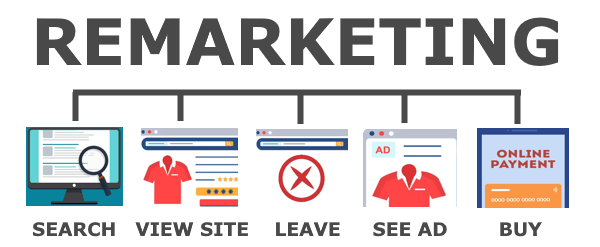Remarketing is a very powerful tool when it comes to marketing your business, services or products. Most customers, especially for larger or important purchases, will research in the days before buying. Remarketing will help keep your company front of mind while they are deciding who to purchase from.

Have you ever searched for a product online and then noticed ads for that product following you around the internet? Or perhaps you’ve visited a website and then received ads for that website on social media platforms? This is the power of targeted remarketing, a digital marketing strategy that allows businesses to reach customers who have already interacted with their brand.
Targeted remarketing is a form of online advertising that uses cookies to track users’ online behavior, allowing businesses to show them ads that are tailored to their interests and behavior. By targeting customers who have already engaged with their brand, businesses can increase the effectiveness and ROI of their digital marketing campaigns.
In this article, we’ll explore the benefits and challenges of targeted remarketing, and offer tips for businesses looking to use this strategy to boost sales and engagement. We’ll also provide a list of platforms that offer retargeting in Ireland, and discuss the GDPR issues that businesses need to be aware of when implementing targeted remarketing campaigns.
How Retargeting Works

Targeted remarketing works by tracking users’ behavior on your website and then showing them relevant ads on other platforms they use, such as social media or Google Ads. The tracking is done through the use of cookies, which are small text files placed on the user’s browser when they visit your website. These cookies allow you to follow users as they navigate away from your site and continue to browse the internet.
Once you have gathered enough data about a user’s behavior, you can use it to serve them personalized ads that are more likely to convert. For example, if a user added an item to their shopping cart but did not complete the purchase, you can show them ads for that same product with a discount code or a reminder of their abandoned cart.
By using targeted remarketing, you can increase your conversion rates and decrease your cost per acquisition. Users who see retargeted ads are 70% more likely to convert than those who don’t, and retargeting campaigns can reduce your cost per acquisition by up to 50%.
In Ireland, businesses that use targeted remarketing see an average increase in conversion rates of 26%, compared to a global increase of 30%. This makes targeted remarketing a powerful tool for businesses looking to improve their ROI.
Now that we’ve covered how targeted remarketing works and its benefits, let’s explore some of the challenges businesses may face when implementing this strategy.
Benefits of Retargeting

If you’re looking for an effective way to increase your online sales, targeted remarketing could be just the solution you need. Here are some of the key benefits of using retargeting:
- Increased conversions: One of the biggest advantages of targeted remarketing is that it can significantly increase your conversion rates. According to a study by AdRoll, retargeting ads can lead to a 10x increase in conversion rates when compared to regular display ads.
- Improved ROI: Retargeting can also help businesses improve their return on investment (ROI). In fact, according to a study by Criteo, retargeted ads have a 726% higher ROI than regular display ads.
- Better engagement: Retargeting allows businesses to engage with customers who have already shown an interest in their brand or products. This can lead to better engagement rates and more loyal customers over time.
- Higher brand recall: By showing ads to customers who have already engaged with your brand, you can increase brand recall and awareness. In fact, a study by AdRoll found that retargeting ads can increase brand recall by up to 1,046%.
- Increased sales: Finally, retargeting can help businesses increase their sales by reaching customers who are already interested in their products. According to a study by SteelHouse, retargeting ads can lead to a 50% increase in sales.
In Ireland, the benefits of retargeting are just as compelling. According to a survey by Wolfgang Digital, retargeting ads had an average conversion rate of 3.09% in Ireland, compared to just 0.77% for regular display ads. This highlights the effectiveness of retargeting in the Irish market.
Globally, the numbers are just as impressive. According to a study by Marin Software, retargeting can lead to a 147% increase in click-through rates and a 164% increase in conversion rates. This demonstrates the potential of targeted remarketing to drive significant business growth.
Which Platforms Offer Retargeting
- Google Ads – Google Ads offers a wide range of retargeting options, including remarketing lists for search ads (RLSAs), display remarketing, and video remarketing. With access to Google’s vast network of websites and users, businesses in Ireland can reach a large and diverse audience.
- Facebook Ads – Facebook Ads also offers retargeting options, including dynamic ads and custom audiences. With over 2.7 million active users in Ireland, Facebook can be a powerful platform for reaching potential customers who have already shown interest in your business.
- LinkedIn Ads – LinkedIn Ads offers a range of targeting options, including retargeting based on website visits and engagement. This can be particularly useful for B2B businesses in Ireland looking to reach professionals in specific industries or job roles.
- Twitter Ads – Twitter Ads offers a range of retargeting options, including website tags and tailored audiences. With over 1.3 million active users in Ireland, Twitter can be a useful platform for businesses looking to reach a younger demographic or engage in real-time conversations.
These platforms offer a range of benefits, including advanced targeting options, access to large and diverse audiences, and the ability to track and measure results. By using a combination of these platforms, businesses in Ireland can create effective and comprehensive retargeting campaigns.
How To Get The Most From Retargeting

Now that we’ve covered the benefits and platforms for retargeting, let’s take a look at some tips to get the most out of your campaigns.
Segment your audience
One of the most effective ways to maximize your retargeting efforts is to segment your audience. By doing so, you can target specific groups of people with tailored ads that resonate with their interests and behaviors. In fact, according to a recent survey, businesses that use segmented campaigns see a 760% increase in revenue.
In Ireland, businesses that have implemented segmented campaigns have reported up to a 20% increase in click-through rates and a 15% increase in conversion rates.
Use dynamic ads
Dynamic ads are ads that change based on the user’s behavior, preferences, and previous interactions with your website or app. They can help increase engagement and conversions by showing the most relevant products or services to each user.
Globally, businesses that use dynamic ads have reported a 34% increase in click-through rates and a 38% increase in conversion rates. In Ireland, businesses have seen up to a 25% increase in click-through rates and a 20% increase in conversion rates.
Set frequency caps
While retargeting can be effective, bombarding your audience with too many ads can have the opposite effect. To avoid annoying your potential customers, it’s important to set frequency caps, which limit the number of times a user sees your ads.
Globally, businesses that use frequency caps have reported up to a 40% decrease in cost per acquisition. In Ireland, businesses have reported up to a 30% decrease in cost per acquisition.
Personalize your ads
Personalization is key in today’s marketing landscape, and retargeting is no exception. By personalizing your ads based on the user’s interests, preferences, and behavior, you can increase engagement and conversions.
Globally, businesses that use personalized ads have reported up to a 55% increase in click-through rates and a 70% increase in conversion rates. In Ireland, businesses have reported up to a 30% increase in click-through rates and a 25% increase in conversion rates.
Challenges of Retargeting
While retargeting can be a powerful tool, it’s important to be aware of the challenges that come with it. One of the biggest challenges is ensuring compliance with GDPR regulations. Under GDPR, businesses must obtain explicit consent from users before using their personal data for advertising purposes.
In Ireland, the Data Protection Commission has issued fines to businesses that have violated GDPR regulations, with fines ranging from €75,000 to €225,000.
Despite these challenges, retargeting can still be a highly effective way to reach and convert potential customers. By following the tips outlined above and remaining compliant with GDPR regulations, businesses can maximize the benefits of retargeting while minimizing the risks.
Conclusion
In conclusion, retargeting is a powerful tool that businesses can use to boost their conversions and increase revenue. However, managing a retargeting campaign requires a lot of time, effort, and expertise. As a business owner, you may not have the resources or skills to create and manage an effective retargeting campaign on your own.
That’s where a professional ads agency comes in. By partnering with an agency, you can take advantage of their expertise and experience to create targeted and effective retargeting campaigns that drive results. With our experience and expertise, you can focus on running your business while leaving the complicated work of retargeting to the professionals.
At Revelate, we have a proven track record of delivering high-performing retargeting campaigns for businesses of all sizes. Our team of specialists will work closely with you to understand your business goals, target audience, and budget to create a customized retargeting strategy that delivers results. Contact us today to learn more about how we can help you grow your business through retargeting.

